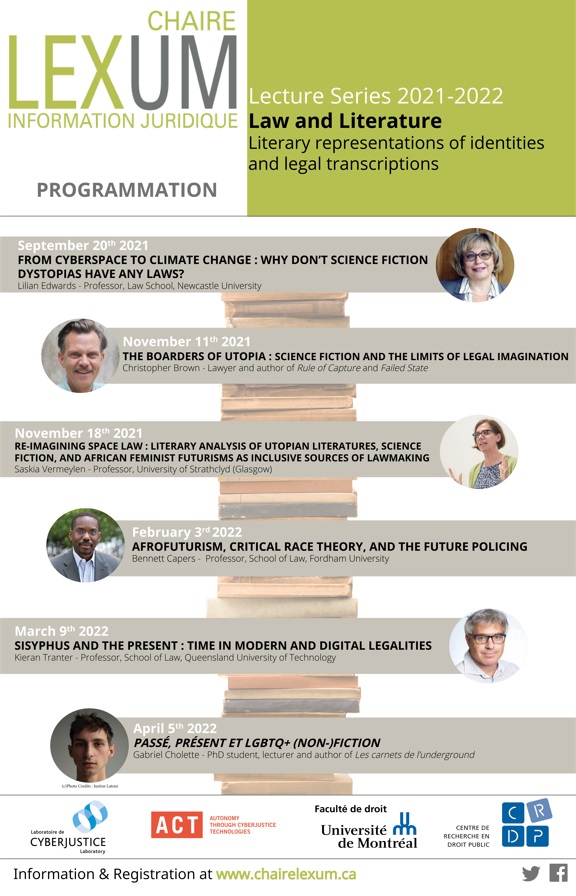Law and Literature
Law and Literature: literary representations of identities and legal transcription
«ENTRE LE DROIT ET LA LITTÉRATURE, LES LIENS SONT NOMBREUX, PROFONDS, PERSONNELS.»
(François OST, « Droit et littérature: variété d’un champ, fécondité d’une approche », (2015) 49 RJT 3.)
Presentation of the conference series
According to François Ost, there are dangerous relations between law and literature. Their respective imaginaries are adversary and divergent: law codifies the social reality, sustains hierarchical choices, creates regulatory fictions (about people), and generalize what is essentially particular; literature opens the social perspectives, explores plural ways, creates emancipatory fictions (about characters), and singularizes what is apparently common. At the same time, the legal and literary imaginaries are complementary and convergent: they both defend instituted positions, exercise instituting functions, defend oppressed minorities and marginal political currents, and deal with norms and forms that constitute the ethical domain. Consequently, law and literature keep a dialectic relation of interaction and confrontation that mobilize the collective imaginary and share roles and destinies.
Together, law and literature might give a voice to the oppressed and the voiceless, move subjects away from anonymity and clichés, and build new approaches and narratives. There is much that (science, speculative, identity) fiction can bring to law and disturb the forces of heteropatriarchy and whiteness that still form the dominant legal structures. As well, the (intellectual, reflexive, subversive) movement of law and literature has potential contributions to develop a social critique susceptible to induce new public policies for diversity, representation, and inclusion. If literature can help law as a mirror to remind that the king is still naked, law can also help literature as a notebook allowing new narratives for a (a bit) better future.
Therefore, it seems that the present times—a pandemic that draws an uncertain future that will probably not resemble the recent past—could make good use of the knowledge and the imaginaries of literary authors and legal scholars to build new perspectives and actions for what is to come. With a particular focus on literary representations of identity and their legal transcriptions, this lecture series intends to present multidisciplinary approaches and strategies which may assist the law to remain relevant and up to the significant tasks of the historical period that is taking shape before us, this half light, characteristic of periods of transition and source of perils.
Conferences
LAWYERS, COURTS, AND THE JUSTICE OF THE FUTURE
Christopher Brown | Lawyer and author of Rule of Capture and Failed State | November 11, 2021
RE-IMAGINING SPACE LAW: LITERARY ANALYSIS OF UTOPIAN LITERATURES, SCIENCE FICTION, AND AFRICAN FEMINIST FUTURISMS AS INCLUSIVE SOURCES OF LAWMAKING
Saskia Vermeylen | The University of Strathclyd (Glasgow) | November 18, 2021
AFROFUTURISM, CRITICAL RACE THEORY, AND THE FUTURE POLICING
Bennett Capers| Fordham University | February 3, 2022
SISYPHUS AND THE PRESENT : TIME IN MODERN AND DIGITAL LEGALITIES
Kieran Tranter | School of Law, Queensland University of Technology | March 9, 2022
PASSÉ, PRÉSENT ET LGBTQ+ (NON-) FICTION
Gabriel Cholette| PhD student, lecturer and author of Les carnets de l’underground | April 5, 2022

This content has been updated on 11 August 2022 at 17 h 38 min.